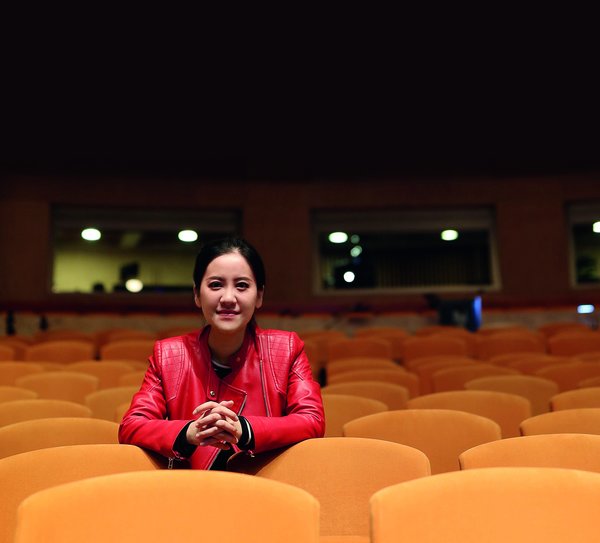
Jiang Ying
Jiang Ying, a young, talented composer, has created the music for three folk music shows — Impression of Traditional Chinese Music, Meeting Traditional Chinese Music Again, and Xuanzang's Pilgrimage. Each of the shows achieved great success. Jiang likes to sit in the auditoriums so she can enjoy her work. She applauds with the audiences, and she is touched beyond words by spectators' appreciation of her work.
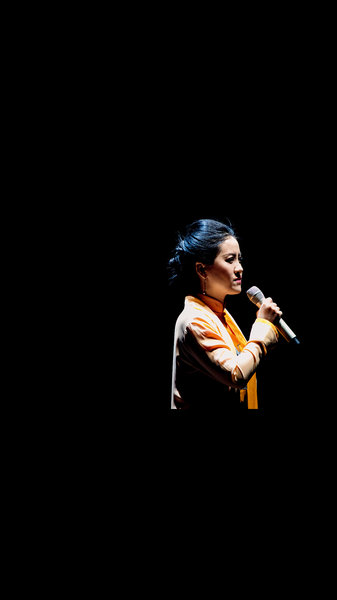
Jiang Ying
Passionate about Composing Music
Jiang is gentle and talented, and many people who like her soul-stirring music are often surprised when they meet her for the first time, because they presume she is an elderly person.
Jiang, who was born in the 1980s, has long been accustomed to such reactions. "When I won an award for my folk orchestral music composition, Empty City Strategy, during my fourth year at university, in 2006, many people thought I was a senior composer, at the age of 70 or so, before they met me. In fact, Mozart began writing operas when he was a teenager. In my opinion, a talented composer who has the spirit of creativity should create his/her own mature works in his/her 20s," she says.
Jiang began learning how to play the pipa (a four-stringed Chinese musical instrument) when she was 6. When she was in middle school, she liked to listen to symphonies, and she painted musical notes in her diary. Gradually, she developed an interest in creating music. "Compared with playing musical instruments, I can express unrestrained emotions by composing, and I can be immersed in the world of imagination. I love this kind of creation … I think it is romantic and inspirational," Jiang says.
While she was studying at Shanghai Conservatory of Music, she won several national awards for her compositions. After she graduated from the university, in 2010, with a master's degree in music composition, she worked at Shanghai Chinese Orchestra. Two years later,she became a composer with China National Traditional Orchestra, in Beijing.
There is a Chinese proverb that says newborn calves are not afraid of tigers. Jiang is brave, and she dares to seek change and innovation. In 2012, she came up with an idea of making a cross-boundary, folk-music program, and she hoped she would be able to work with famous director Wang Chaoge on the project.
She and Wang created Impression of Traditional Chinese Music. They referred to it as a kind of folk-music drama that perfectly combined folk music and choreography. Jiang felt great pressure during the production of the drama. She tried her best to compose the music in a perfect way.
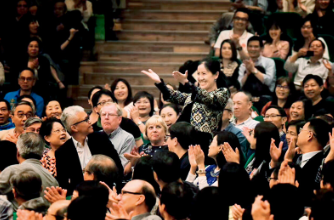
Jiang Ying
Classic Works
Jiang won the 2013 Young Composer Award, presented by China's Ministry of Culture, for her music composition and arrangement in Impression of Traditional Chinese Music. In 2015, Jiang, Wang and their team produced Meeting Traditional Chinese Music Again, the companion piece to Impression of Traditional Chinese Music.
Compared with Impression of Traditional Chinese Music, the production of Meeting Traditional Chinese Music Again was more challenging, because Jiang needed to recompose and recreate 10 renowned classic melodies.
"I pondered the music of Moonlit River in Spring over and over again. The music was gentle instead of dramatic. How could I change the original sense of the music? One day, I played the music slowly on the piano, and I changed the harmony … Suddenly, it sounded quite different, and I felt that I had found the right feeling to change the music. It was hard to describe the whole process. Maybe it was what people called inspiration. I felt the beauty of music was engraved in my heart," Jiang says.
"The reason why classic music has been passed down through the generations is that classic music has 'good genes.' Classic music will have new life as long as we maintain its essence and make adjustments to it, in accordance with modern aesthetic standards," she adds.
"As you can see, I am very young. When I open music scores of predecessors, I am full of affection. I created the music in Meeting Traditional Chinese Music Again with awe. I want to tell (spectators) our young generation will never disgrace our mission. A composer is behind the scenes. But, today, I step on the stage. I want to pay my respects to people in China's folk music field, and to all the performers of China National Traditional Orchestra on the stage," Jiang told the audience after one of the performances of Meeting Traditional Chinese Music Again.
At the end of 2015, a delegation of more than 130 artists of China National Traditional Orchestra, led by the orchestra's head, Xi Qiang, visited the United States. They staged five commercial performances at the Kennedy Center for the Performing Arts, in Washington, and the Lincoln Center for the Performing Arts and Carnegie Hall, both in New York. Their performances were well - received by American audiences.
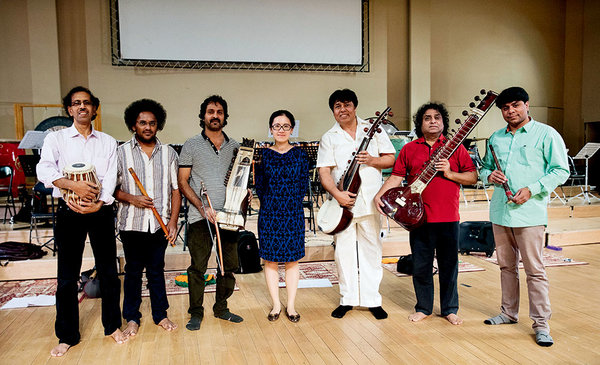
Jiang Ying and her team in India
Xuanzang's Pilgrimage
Jiang has a great imagination. In 2017, she and her team produced a traditional instrumental music drama, Xuanzang's Pilgrimage, which tells the well-known story of Xuanzang (or Tangseng), a monk who went to India to obtain the sacred Buddhist texts. Jiang composed, wrote and directed the drama.
When she talks about the creation of such a drama, she says, "Meeting Traditional Chinese Music Again was composed with independent melodies. Then, I thought about whether we could produce a concert based on a story, just like an opera. If we could, we would achieve a breakthrough in cross-boundary innovation of Chinese folk music." Xuanzang's Pilgrimage perfectly integrates instrumentals and stage performances. In addition to Xuanzang's story, the drama tells the history of Chinese music, and it demonstrates the charm of various ethnic groups' music.
Jiang says she hopes to display Chinese music culture, ethnic culture of China's ethnic groups, and folk customs along the ancient Silk Road by presenting the story of Xuangzang.
The performers play 73 types of the traditional musical instruments that are found in areas along the Silk Road, such as the flute, pipa, huqin (a general term for certain two-stringed bowed instruments) and vertical bamboo flute.
Jiang believes Xuangzang's indomitable spirit, and the spirit of pursuing faith, spread positive energy. The drama is a dialogue between Jiang and Xuangzang — through time and space.
It took nearly two years for Jiang and her team to produce the drama.
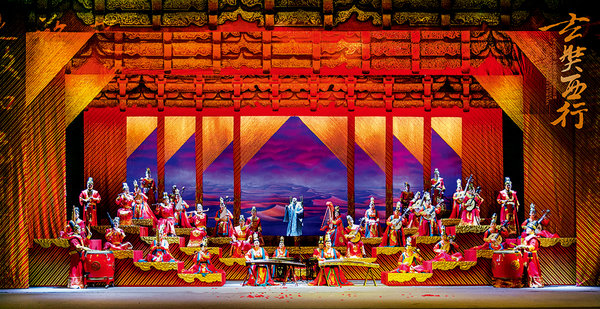
Xuanzang's Pilgrimage
In the Spotlight
What is good music? Jiang says, "Good works of art definitely touch people's hearts. Good music should strike a chord in one's heart. For example, people might not feel the magnificence of the Tang Dynasty (618-907) when they read … But when people listen to the solemn music of the Tang Dynasty, they will soon have the feeling of traveling back in time to the dynasty."
According to the Chinese idiom, "Highbrow songs find few singers." Jiang has her own understanding of the idiom. She says, "I think a person's understanding of music is closely related to his/her cultural background. People with different cultural backgrounds have different understandings of music. For example, foreigners who know little about Chinese culture will find Chinese operas hard to understand."
"Both the performers and the viewers enjoy Xuanzang's Pilgrimage. It demonstrates that a truly excellent and innovative work will be loved by the public, and will also be popular in the market. As such, we can bring traditional Chinese music and musical instruments into the spotlight. Only when spectators love traditional culture, from the bottom of their hearts, can we achieve a better development of traditional culture," she adds.

